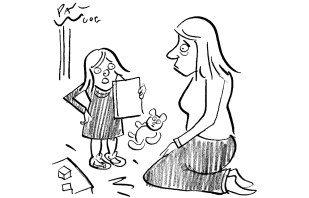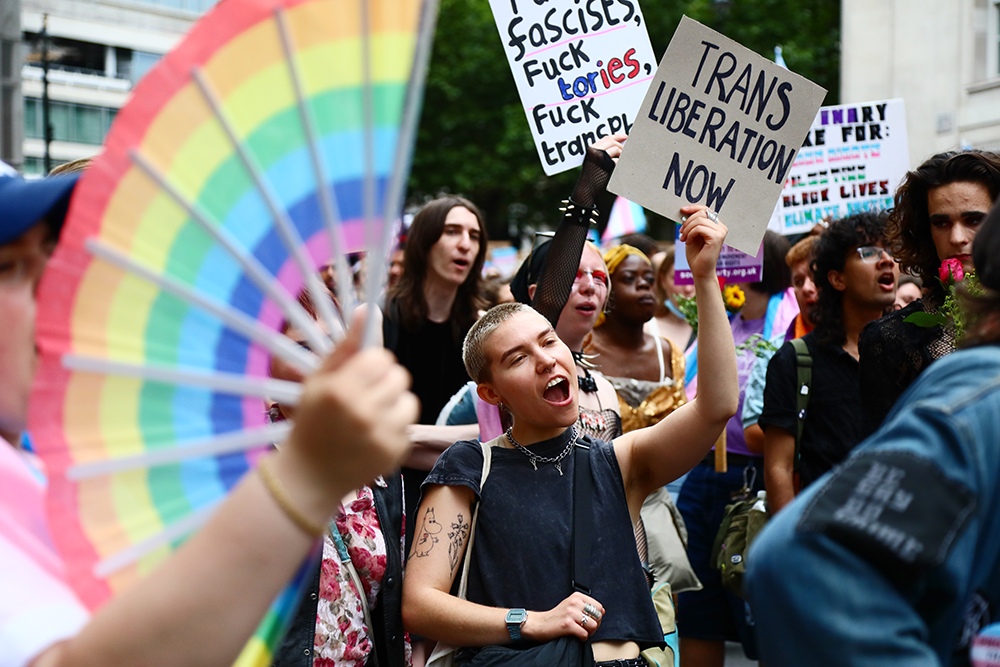
Matthew Parris has narrated this article for you to listen to.
In the Palace of Westminster a fortnight ago, I spoke at a reception celebrating the 50th anniversary of the Tory gay rights movement now called LGBT+ Conservatives. And last weekend I read a book to be published on 9 October. It turns out that its author and I are saying the same thing.
Professor Ronan McCrea has chosen the title The End of the Gay Rights Revolution: How Hubris and Overreach Threaten Gay Freedom. My speech bore no such title, but here’s more or less what I said. I began by recalling, for a young audience, the dismal beginnings of what was to prove a cultural revolution.
‘I will never forget the sniggers and winces at our then name: the Conservative Group for Homosexual Equality. Nor forget, as a parliamentary vice-president in the early 1980s, our struggle even to get our name into printed fringe guides to Tory conferences.
‘Never forget those fringe meetings in airless basement rooms at tawdry hotels. Nor the warm white wine, the furtive glances to see who else was there. Few ever were.
‘And never, ever forget the brave, tiny band of my fellow Tory MPs. People like that noble soul, long dead, Martin Stevens, MP for Fulham. “Stick to your guns, dear boy,” he told me. And we did, we who walked that nail-biting tightrope between not lying and not declaring.
‘But I’ll never forget, either, that it was John Major’s Conservative government that – nearly 30 years after the last reform – dared break the thick ice covering what had seemed a frozen landscape. Sir John reduced the age of male homosexual consent to 18.
‘And then? Silence. The silence of most of the electorate. “So what?” the silence said. “Who cares?” Most had long accepted homosexuality as a fact of life. Our political class had been left behind by the remorseless sweep of cultural history.
‘But be clear. What won it for us was not the argument for public approval – many didn’t approve – but for personal privacy, for “live and let live”, for “each to his own”.
‘Always keep an eye on where the public are. Don’t drag your feet, but don’t lurch further than you can bring people with you. Though a founder-member, I have not renewed my membership of Stonewall because I don’t associate trans issues with ours. Like many gays, I don’t always understand them.
‘We should never tell ourselves that freedom to be what we are means carelessness in how we act’
‘But of this I’m certain: gay men are not girls trapped in the bodies of boys, and lesbian women are not boys trapped in the bodies of girls. We should think twice before getting tangled in the trans-rights cause. Women have rights too.
‘And lastly, this. Ours is a moral cause or it is nothing. It is more than an indifferent shrug at every sexual desire. It is not the case for Anything Goes. We should never tell ourselves that freedom to be what we are means carelessness in how we act, how we conduct ourselves: that is what the word “Conservative” means in this movement’s title. We are well on our way to re-entering what one might call the moral mainstream – no longer a secret gang outside the norms of decency. And there do exist codes of conduct within that wider British family of which we’re becoming a part.
‘So – mark this – I remember what it’s like when the world seems to hate you; yet I’ve learned, through politics and journalism, that society can turn in your favour fast. But it can turn again, too, and just as fast. So keep a wary eye out for the reservations that some of the wider public may feel about the wilder shores of gay culture but suppress because homophobia’s now unfashionable.

‘Don’t sneer at those quiet doubters. Don’t try to outrage them. The days of giant inflatable phalluses at Pride rallies should be over. Tread carefully. A gay culture of instant and loveless gratification – “better with your boots on” – will undermine the respect our movement has earned: a respect which could prove more brittle than we know.’
That, anyway, was the worry that I was fumbling to articulate. But then I opened Professor McCrea’s book to see the case put so much more cogently, with so much better supporting evidence. The End of the Gay Rights Revolution is a warning call: a reminder that, as he says, Barack Obama spoke too soon when he said ‘the arc of history bends towards justice’; and that Fukuyama’s The End of History was a false dawn.
History, says McCrea, is blind, not linear. ‘We’re on the right side of history’ is a ludicrous claim. History has no sides. There’s ‘a large pool of anti-gay feeling’, he says, ‘ready to be reactivated’. And there are forces abroad, ready to exploit incipient public misgivings about gay liberation. Already we have a sharp cooling on ‘diversity’ issues. Even today (he says), an idea current in gay circles that with sexual behaviour ‘there are no rules other than consent’ would not win widespread public approval.
This eminently readable book explores in depth the public health consequences of promiscuity (McCrea cites evidence that half of all gay 18-year-old American men will be HIV-positive by the age of 50 if infections continue to rise at their current rate). Homosexuals, he notes, are at the outer edge of the wider liberalisation of attitudes to sex that began in the 1960s. There are already signs of a retraction on issues such as abortion. If boundaries begin to drawn in again, gays will find ourselves early to be exposed.
If I’d read McCrea’s book before I made my speech to LGBT+ Conservatives, I’d have ended with this quote: ‘The sad… fact is that gays and lesbians are, in all countries, a small minority whose freedom will always and everywhere depend on the kindness, or at least the acquiescence, of strangers. We need to keep a majority on side, and that majority will be more likely if we can appeal to people beyond radical and ultra-liberal circles.’
We gays ask for respect. We need to show it, too.








Comments